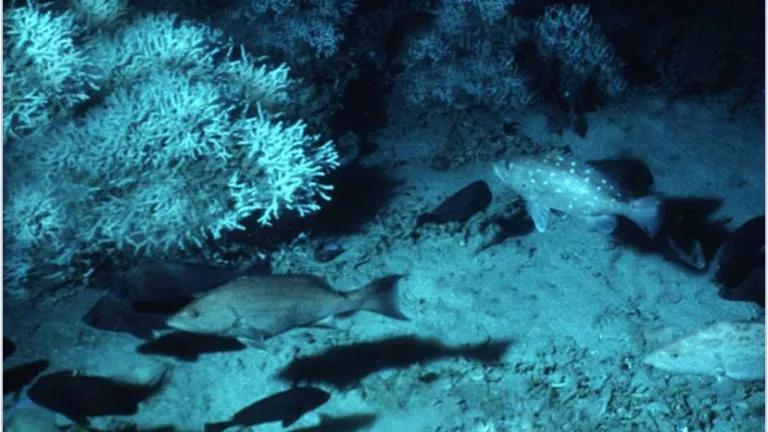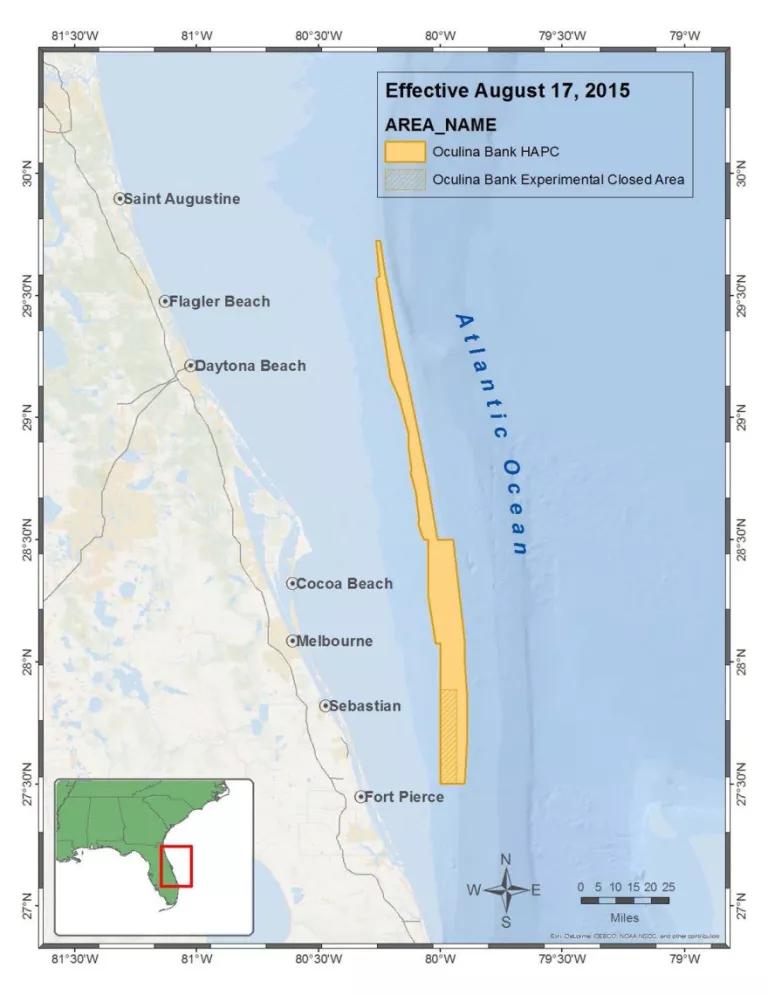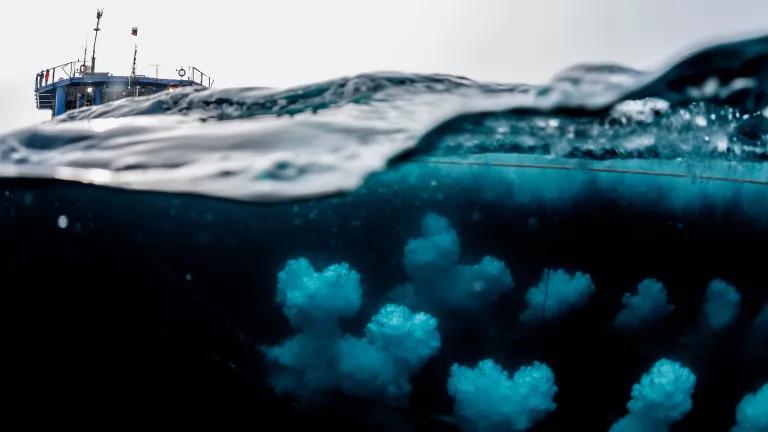
Scamp, snowy grouper, and other fish swimming amongst Oculina coral thickets.
In a huge win for corals, fish and other marine life, and all of us who depend on and enjoy our ocean wildlife, the Biden administration rejected an ill-advised proposal to permit harmful fishing gear in the globally unique Oculina Bank coral ecosystem off the Florida coast.
Nearly 50,000 individuals joined with NRDC, our partners and members of the local community in asking the federal ocean agency, the National Oceanic and Atmospheric Administration (NOAA), to oppose the South Atlantic Fishery Management Council’s Coral Amendment 10. The regional fisheries council amendment would have restored rock shrimp fishing to this remarkable area just beginning to recover from decades of harm.
The significance of Oculina Bank
While thinking of Florida’s corals will likely conjure colorful images of the Florida Keys’ coral reefs, another amazing and vulnerable reef—Oculina Bank—hides in the depths of central Florida’s Atlantic coast. Known to exist only in this narrow 100-mile strip of Florida coast, thickets of slow-growing Oculina varicosa, or ivory tree coral, create essential habitat for diverse communities of marine life, with a single 12-inch coral able to host up to 2,000 animals. Small fish, shrimp, and crabs live amid the coral, supporting the health of the Oculina Bank ecosystem and beyond. The habitat also provides important spawning ground for vulnerable species of snowy grouper, gag grouper and red porgy—popular targets of both recreational and commercial fishing.
In the 1970s and into the 80s, Oculina Bank hosted productive fishing grounds, but throughout that time period, shrimp and other bottom trawl fisheries that tow heavy, weighted nets along the seafloor had effectively reduced 90 percent of the reef to rubble. In 1984, NOAA and the South Atlantic Fishery Management Council designated the reef and surrounding area as a Habitat Area of Particular Concern (HAPC) and put measures in place to protect the remaining coral from harmful fishing activities. The area’s boundaries and protections were further extended in 2015 as an Essential Fish Habitat (EFH)-HAPC.

Map of the Oculina Bank Habitat Area of Particular Concern (HAPC).
Both EFH and HAPC area types recognize the importance of key habitats for our nation’s fishery resources, but don’t necessarily offer additional protections unless Councils act to restrict fishing gear types within them. (For a deeper dive into EFH and how it has been used across the regions, check out NRDC’s recent report, A Safety Net for Ocean Fisheries.) In the case of Oculina Bank’s HAPC, these designations and the Council’s actions to restrict fishing activities which are harmful to seafloor ecosystems were critical to protecting the remnants of the reef and giving the coral an opportunity to regenerate.
Coral Amendment 10 threatens coral recovery
As the coral is just beginning to recover through decades of protections, the South Atlantic Fishery Management Council recently asked the Biden administration to reopen part of Oculina Bank HAPC to rock shrimp trawling. This activity would not only put the fragile coral in the direct path of the destructive nets but would also create plumes of sediment and debris that smother the remaining living corals, threatening the health of the entire Oculina Bank habitat once again.
Alarmingly, in their proposal to re-open the area, the Council failed to use the best scientific information available—disregarding the advice of their own Coral Advisory Panel, who unanimously voted against moving forward with the proposal—and ignored the likely minimal economic benefits to the rock shrimp fishery (categorizing these benefits as unknown). As NOAA Fisheries noted in their disapproval, the Council’s analysis was plainly insufficient to support the proposed reversal of critical EFH-HAPC protections, and it also failed to demonstrate how Coral Amendment 10 would minimize bycatch of other marine species.
In disapproving the South Atlantic Fishery Management Council’s Coral Amendment 10, NOAA cited similar concerns to those NRDC raised in our public comment letter: Coral Amendment 10 was inconsistent with the Magnuson-Stevens Fishery Conservation and Management Act—the U.S. law that helps manage for the long-term sustainability of our fishery resources—and the goals and objectives of the Coral Fishery Management Plan, which intends to balance the optimal benefits from coral as a resource with the necessary conservation of coral and coral reefs.
Now is the time to protect marine life for all
The Biden administration’s America the Beautiful campaign encourages action to reduce biodiversity loss, defend against climate change, and increase equitable access to nature. With scientists clearly stating that we must protect more of the planet in its natural state to fight the climate and biodiversity crises, reversing protections for the rare, and highly vulnerable, corals of Oculina Bank was a clear step in the wrong direction. We urgently need more meaningful and durable ocean protections—across a broad range of habitats—not fewer. The South Atlantic Fishery Management Council’s proposal not only risked one-of-a-kind coral habitat but also prioritized the minimal, short-term economic benefits to the rock shrimp fishery over the benefits meaningful conservation offers to the well-being of all others, including other fisheries and ocean users.
What’s next for Oculina Bank
NOAA Fisheries, thankfully, maintained the existing protections throughout the vulnerable Oculina Bank HAPC. However, under the Magnuson-Stevens Act, the Council has an opportunity to address the deficiencies in their proposal and may elect to submit a revised amendment. NRDC will remain vigilant and continue our efforts with partners to show NOAA that maintaining protections for Oculina Bank is the right decision for all of us who value this vulnerable and unique ocean gem.




